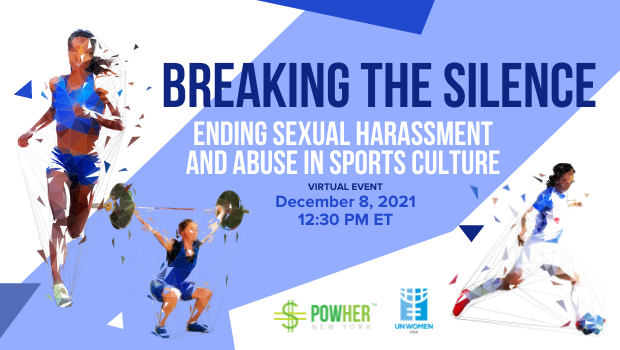“Men need to work on us—our own growth as men, as full human beings. I don’t use the term “toxic” masculinity—we are not like “toxic waste”. It’s ok to be tough but also loving, caring, vulnerable—we need to build a full set of skills. We need to start young to change the way boys and girls are raised. How young? I started when my babies were born.”
— Don McPherson
While women’s participation in amateur and professional sports has grown exponentially in the past decades, the standing of female athletes and teams has not risen accordingly. That is due substantially to a sports culture dominated by a narrow view of masculinity, creating a culture of control, sexual harassment and abuse.
As greater opportunities for women in sports emerge, progress is challenged by unexamined gender norms, inequity, unequal pay, sexual harassment and abuse that permeates all levels of sports. Silence by those in power—coaches, administrators, parents—creates a haven for perpetrators of this harmful culture.
This event featured:
- Don McPherson: Author of You Throw Like a Girl: The Blind Spot of Masculinity and former National Football League and Canadian Football League quarterback
- D’Ann Keller: Senior Associate Athletic Director for Sports Administration and Senior Woman Administrator, University of Buffalo
- Karen King, PhD: Commissioner of Public Advocacy, Erie County and Executive Director, Erie County Commissioner on the Status of Women (moderator)
This event focused on the sports pipeline: how negative aspects of sports culture begin at an early age and how close relationships between coaches, staff and athletes can sustain gender inequity at every level moving forward from middle school, high school, and college to the professional level. This discussion will dig into how we can eradicate the harmful practices in sports culture through changes to cultural systems and institutions.
This event is hosted by PowHer New York and co-sponsored by UN Women USA.
Event Recap
Mary Luke, Vice President PowHer NY and UN Women USA, introduced the event as the third and final in a series of virtual conversations on how cultures based in patriarchy and power sustain inequality, harassment, and abuse of women.
She turned the program over to the moderator, Dr. Karen King, Commissioner of Public Advocacy of Erie County, member of PowHer NY. Karen introduced Don McPherson, former National Football League and Canadian Football League quarterback and author of You Throw Like a Girl: The Blind Spot of Masculinity. She began the conversation by asking him about the relationship between sports culture and sexual harassment and abuse.
Don McPherson talked about “narrow” masculinity: the socially-acceptable expectations for men, especially athletes, that they must be strong, tough, impervious to pain. This behavior contributes to the problem of violence against women. He calls this the “blind spot,” and it shuts down feelings and limits growth as human beings. He posited that we need new models that expand the definition of what it means to be a man – it’s ok to be tough but also loving, caring, vulnerable. Men need to build a full set of skills, work on their growth as full human beings. We need to start young to change the way boys and girls are raised that reinforce gender stereotypes. He then talked about how sports culture: kids play the same sport for years and the focus is too much on getting on a winning team and career expectations, rather than playing, having fun and learning social skills.
Karen then introduced D’Ann Keller, Senior Associate Athletic Director for Sport Administration and Senior Woman Administrator, University of Buffalo. She began by asking D’Ann how we need to address sexual harassment/abuse in collegiate athletics.
D’Ann began by saying that there is a deficit of trust. Coaches and staff need to have conversations with athletes about male/female behavior. They need to monitor situations and recognize red flags before something happens. A lot of abuse begins in bars so they need to educate students about alcohol and be willing to intervene where there is a lot of drinking. In terms of gender inequity, there are very few women athletic directors, coaches, managers so a male perspective dominates. How to get more women into pipeline? A conscious effort needs to be made to encourage young women to enter the field, to broaden their skills, exposure, and responsibility.


